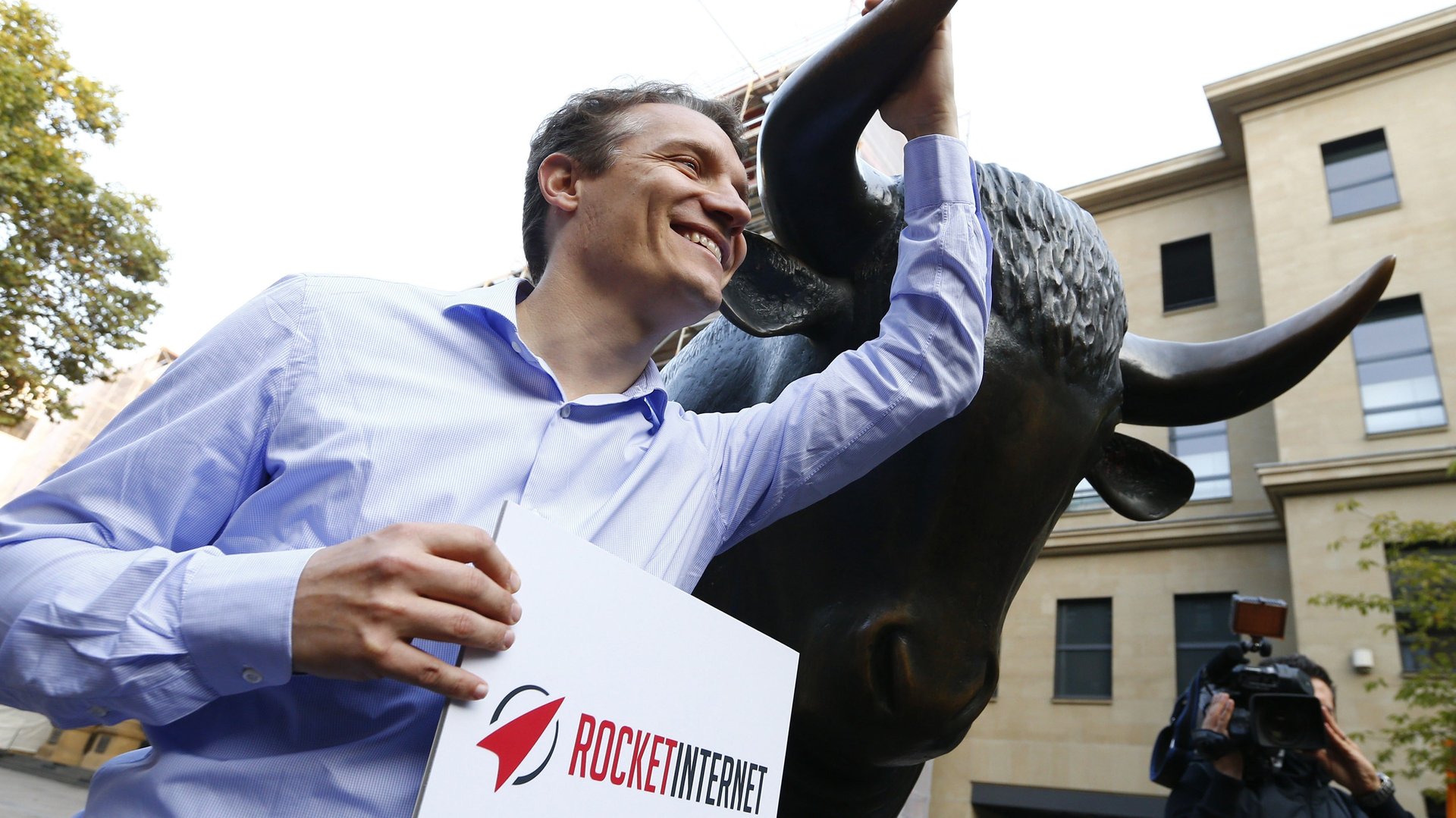How much is Germany’s glorified $5 billion startup factory really worth?
Rocket Internet’s business is fairly straightforward: Copy an established e-commerce business model—Amazon, Expedia, Uber—and quickly deploy it in markets where such things don’t yet exist. This model proved its worth last week, when Rocket sold a stake in Lazada, a four-year-old Amazon clone in Southeast Asia, to China’s Alibaba for 15 times Rocket’s initial investment.


Rocket Internet’s business is fairly straightforward: Copy an established e-commerce business model—Amazon, Expedia, Uber—and quickly deploy it in markets where such things don’t yet exist. This model proved its worth last week, when Rocket sold a stake in Lazada, a four-year-old Amazon clone in Southeast Asia, to China’s Alibaba for 15 times Rocket’s initial investment.
Since Berlin-based Rocket’s founding in 2007, its portfolio companies have grown to employ more than 36,000 people in 110 countries. That sort of growth, and the sort of returns generated by the Lazada deal, would cheer Rocket’s investors, if they didn’t have such a hard time figuring out what the group is actually worth.
The simple answer is that Rocket is worth €4.5 billion ($5.1 billion), the market capitalization of its Frankfurt-listed shares. But there is very little agreement about this value, with some analysts forecasting a fair value for Rocket’s shares of around 10% below where it currently trades (around €27), and others reckoning it’s worth almost double the price.
Tangled web
Rocket’s holding structure features shareholdings in more than 500 far-flung companies, and its model of breakneck growth means that investors can’t rely on the standard, stable financial measures they normally use to judge a company’s value. Indeed, the numbers that investors care most about aren’t reported in Rocket’s official financial statements. Instead, they look to self-reported, unaudited estimates of Rocket’s “last portfolio value” (LPV), or the theoretical value of the stakes it holds in portfolio companies.
According to Rocket, its LPV has been climbing recently, outstripping the value that the market places on its shares by some distance:
It’s not new for a company to think that’s it worth more than the market says it is. But opacity has long been a problem for investors trying to get their heads around Rocket’s business prospects. Since it doesn’t own a majority of the shares in all its portfolio companies, the group cannot include certain results in its consolidated financials. What’s more, it notes that it doesn’t exert management control over some of companies in which it does hold a majority, as well.
So, instead of parsing its financial statements, analysts look for guidance in Rocket’s periodic LPV statements. These are primarily based on funding rounds, adjusted for Rocket’s share of the equity. So long as the companies in Rocket’s portfolio—many of which are fast-growing but also loss-making—fetch higher valuations each time they raise new money, the group’s LPV goes up. If only its share price would do the same—Rocket’s shares have lost nearly 40% of their value over the past year.
“In the main, [Rocket’s] communication focuses on all things LPV,” wrote analysts from Jefferies in a recent note. “Disclosure is certainly not comprehensive and, one has to say, there is a promotional tone running through the prints, for sure.”
Sarah Simon of Berenberg Bank is one of the most bullish analysts on Rocket, but describes it as “hugely opaque.” This is why the company’s share’s trade at such a ”massive discount,” she adds.
Guesstimating the future
Valuing private companies is an inexact science. For its part, Rocket derives its numbers from the last valuation a company fetched during a funding round, which means that the estimates can become stale, which is particularly dangerous since tech valuations have been tumbling of late. Rocket’s��latest LPV report, published at the end of March, lists only four companies, out of 34, with valuations established in Nov. 2015 or later. To complicate matters further, Rocket established a separate venture-capital fund in January with the aim of investing in European tech startups, including its own. That fund has $420 million in the bank, including $50 million from Rocket itself.
Kinnevik, a Swedish investment firm, has invested in many of the biggest startups in Rocket’s portfolio—along with holding a 13% stake in Rocket itself. It also publishes the values of the same companies, typically at half or less of what Rocket says they’re worth, as reported by the Wall Street Journal (paywall). That’s because, in many cases, Kinnevik derives companies’ values from multiples of their revenues, rather than fundraising-based valuations.
This produces more conservative valuations, but that doesn’t necessarily mean that they’re more accurate. Kinnevik valued Lazada at $710 million in Dec. 2015; last week, Alibaba paid double that for a controlling stake in the retailer.
Rocket will need more upside surprises like that to convince investors that its prospects are as lucrative as it claims they are. That means either whipping its companies into IPO-ready shape or finding deep-pocketed buyers for trade sales. But Rocket’s most mature companies are consistently unprofitable, and in Alibaba it found an exceptionally well-aligned buyer.
And so it seems that Rocket’s assessment of its business model’s value—simple on paper, fiendishly complex in reality—will continue to clash with a skeptical market. “Investors are not prepared to credit Rocket with that valuation today,” says Simon of Berenberg.